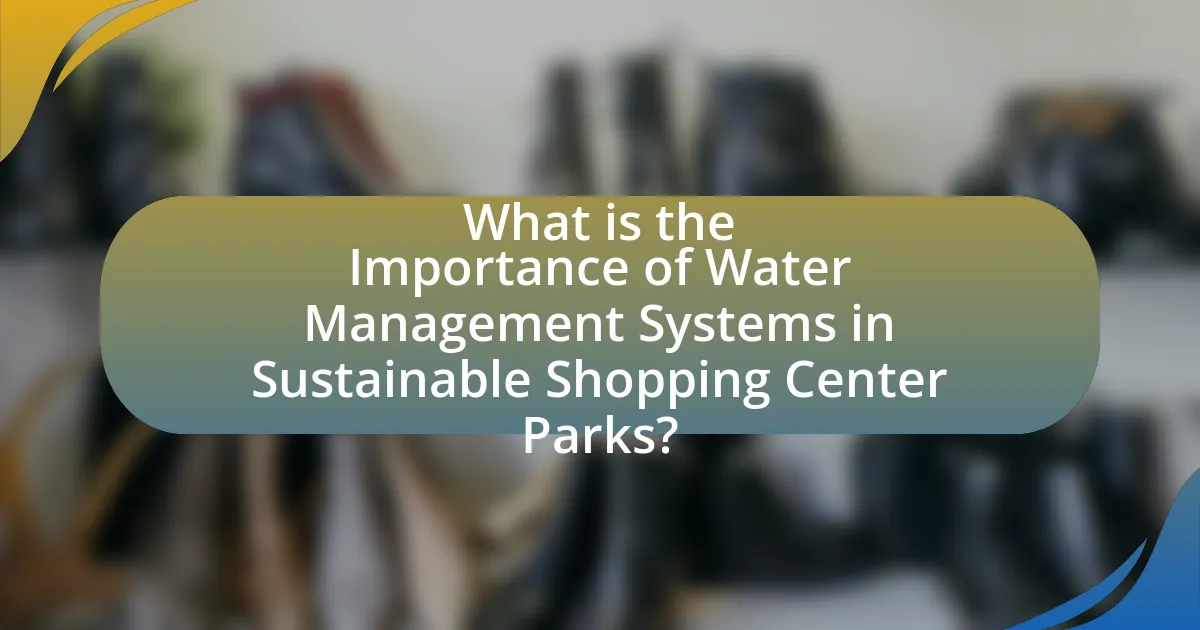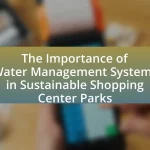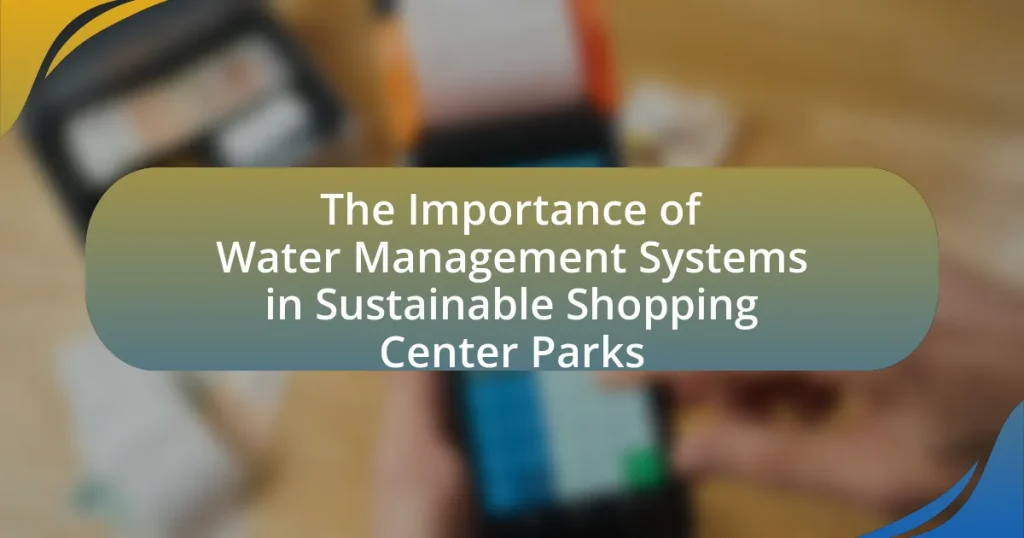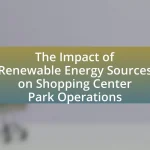Water management systems play a vital role in the sustainability of shopping center parks by optimizing water usage, reducing waste, and enhancing environmental health. These systems incorporate techniques such as rainwater harvesting, efficient irrigation, and wastewater recycling, which collectively minimize the demand on local water resources and support biodiversity. Key components include water supply management, demand management, water quality monitoring, and infrastructure maintenance, all of which contribute to effective water management. The implementation of these systems not only improves the aesthetic appeal and visitor experience of parks but also leads to significant cost savings and positive impacts on local ecosystems.

What is the Importance of Water Management Systems in Sustainable Shopping Center Parks?
Water management systems are crucial in sustainable shopping center parks as they optimize water usage, reduce waste, and enhance environmental sustainability. These systems facilitate the efficient collection, storage, and distribution of water, ensuring that parks maintain their greenery while minimizing the ecological footprint. For instance, implementing rainwater harvesting can significantly decrease reliance on municipal water sources, leading to a reduction in water costs and promoting conservation. Additionally, effective drainage systems prevent flooding and erosion, protecting both the park’s infrastructure and surrounding areas. Studies have shown that parks with integrated water management systems can reduce water consumption by up to 50%, demonstrating their effectiveness in promoting sustainability.
How do water management systems contribute to sustainability in shopping center parks?
Water management systems contribute to sustainability in shopping center parks by optimizing water use, reducing waste, and enhancing ecosystem health. These systems implement techniques such as rainwater harvesting, irrigation efficiency, and wastewater recycling, which collectively minimize the demand on local water resources. For instance, a study by the U.S. Environmental Protection Agency indicates that effective water management can reduce water consumption by up to 50% in commercial landscapes. Additionally, these systems help maintain green spaces, which improve air quality and provide habitats for local wildlife, further supporting biodiversity.
What are the key components of effective water management systems?
The key components of effective water management systems include water supply management, demand management, water quality monitoring, and infrastructure maintenance. Water supply management ensures the availability of adequate water resources through efficient sourcing and distribution. Demand management focuses on optimizing water usage through conservation practices and technologies, reducing waste. Water quality monitoring involves regular testing and assessment to ensure that water meets safety standards, protecting both human health and the environment. Infrastructure maintenance is crucial for preventing leaks and ensuring the reliability of water delivery systems. These components collectively contribute to sustainable water management, as evidenced by studies showing that integrated approaches can reduce water consumption by up to 30% in urban areas.
How do these components interact to promote sustainability?
Water management systems, green infrastructure, and community engagement interact to promote sustainability in shopping center parks by optimizing resource use, enhancing biodiversity, and fostering social responsibility. Water management systems efficiently regulate water flow and quality, reducing waste and preventing pollution, which is crucial for maintaining healthy ecosystems. Green infrastructure, such as rain gardens and permeable pavements, complements these systems by facilitating natural water absorption and filtration, thereby supporting local flora and fauna. Community engagement ensures that stakeholders are involved in decision-making processes, leading to increased awareness and commitment to sustainable practices. Together, these components create a holistic approach that not only conserves water but also enhances the ecological and social value of shopping center parks, ultimately contributing to long-term sustainability.
Why is water management critical for shopping center parks?
Water management is critical for shopping center parks because it ensures the sustainability and aesthetic appeal of these green spaces. Effective water management systems help maintain healthy landscapes, support biodiversity, and reduce operational costs associated with irrigation and maintenance. For instance, studies show that well-designed water management can reduce water usage by up to 50%, which is essential in areas facing water scarcity. Additionally, proper management prevents water runoff and pollution, contributing to environmental protection and compliance with regulations.
What environmental challenges do shopping center parks face regarding water usage?
Shopping center parks face significant environmental challenges regarding water usage, primarily due to high demand for irrigation and maintenance of green spaces. These parks often require substantial water resources to sustain landscaping, which can lead to over-extraction from local water supplies, especially in arid regions. Additionally, inefficient irrigation practices can result in water wastage, exacerbating the strain on available water resources. According to the U.S. Environmental Protection Agency, landscape irrigation accounts for nearly one-third of all residential water use, highlighting the potential impact of shopping center parks on local water systems. Furthermore, runoff from these parks can lead to water quality issues, as fertilizers and pesticides used in landscaping may contaminate nearby water bodies.
How can water management systems mitigate these challenges?
Water management systems can mitigate challenges in sustainable shopping center parks by optimizing water usage, enhancing water quality, and reducing runoff. These systems employ techniques such as rainwater harvesting, which captures and stores rainwater for irrigation, thereby decreasing reliance on municipal water sources. Additionally, advanced filtration and treatment processes improve the quality of water used in landscaping, ensuring that it meets environmental standards. Furthermore, implementing permeable surfaces and green infrastructure reduces stormwater runoff, which helps prevent flooding and erosion. According to the U.S. Environmental Protection Agency, effective water management can reduce runoff by up to 90%, demonstrating its significant impact on sustainability in urban environments.
What role do water management systems play in enhancing visitor experience?
Water management systems significantly enhance visitor experience by ensuring the availability of clean, safe, and aesthetically pleasing water features in shopping center parks. These systems facilitate the maintenance of water quality, which is crucial for activities such as recreational use, relaxation, and enjoyment of natural landscapes. For instance, well-managed water bodies can provide serene environments that attract visitors, thereby increasing foot traffic and dwell time. Additionally, effective water management can prevent issues such as flooding or water scarcity, ensuring that visitors can enjoy the park facilities year-round. Studies have shown that parks with well-integrated water management systems report higher visitor satisfaction and engagement, as these systems contribute to the overall ambiance and functionality of the space.
How do these systems improve the aesthetic appeal of shopping center parks?
Water management systems enhance the aesthetic appeal of shopping center parks by integrating natural elements such as water features, which create visually pleasing landscapes. These systems facilitate the design of ponds, fountains, and streams that not only serve functional purposes but also contribute to the overall beauty of the environment. For instance, the presence of water can attract wildlife, promote biodiversity, and provide a serene atmosphere, making the shopping center more inviting. Additionally, well-maintained water management systems can prevent flooding and erosion, ensuring that the park remains visually appealing and accessible throughout the year.
What impact do they have on recreational activities within the parks?
Water management systems significantly enhance recreational activities within parks by ensuring a reliable supply of water for landscaping, irrigation, and water features. These systems maintain the aesthetic appeal of parks, which attracts visitors and encourages outdoor activities such as picnicking, walking, and sports. For instance, well-maintained green spaces supported by efficient water management can increase park usage by up to 30%, as reported by the National Recreation and Park Association. Additionally, water features like ponds and fountains provide opportunities for relaxation and recreation, further enriching the visitor experience.
How can shopping center parks implement effective water management systems?
Shopping center parks can implement effective water management systems by utilizing rainwater harvesting, installing permeable pavements, and incorporating smart irrigation technologies. Rainwater harvesting systems capture and store rainwater for landscape irrigation, reducing reliance on municipal water sources. Permeable pavements allow water to infiltrate the ground, minimizing runoff and promoting groundwater recharge. Smart irrigation technologies, such as moisture sensors and weather-based controllers, optimize water usage by adjusting irrigation schedules based on real-time environmental conditions. These methods collectively enhance water conservation and sustainability in shopping center parks.
What best practices should be followed for designing water management systems?
Best practices for designing water management systems include implementing integrated water resource management, utilizing sustainable drainage systems, and promoting water conservation techniques. Integrated water resource management ensures that all aspects of water use, including supply, demand, and quality, are considered holistically, leading to more efficient and sustainable outcomes. Sustainable drainage systems, such as green roofs and permeable pavements, help manage stormwater effectively, reducing runoff and improving water quality. Additionally, promoting water conservation techniques, such as rainwater harvesting and greywater reuse, can significantly reduce the demand on freshwater resources. These practices are supported by studies indicating that effective water management can lead to a 30% reduction in water usage in urban areas, enhancing sustainability in shopping center parks.
How can technology be integrated into water management solutions?
Technology can be integrated into water management solutions through the use of smart sensors, data analytics, and automated irrigation systems. Smart sensors monitor soil moisture levels and weather conditions, allowing for precise water application, which reduces waste and optimizes usage. Data analytics processes the information collected from these sensors to provide insights into water consumption patterns and identify areas for improvement. Automated irrigation systems can adjust watering schedules based on real-time data, ensuring that plants receive the right amount of water at the right time. For instance, a study by the International Water Management Institute found that implementing smart irrigation technologies can reduce water usage by up to 30%, demonstrating the effectiveness of technology in enhancing water management practices.
What are the long-term benefits of investing in water management systems for shopping center parks?
Investing in water management systems for shopping center parks yields significant long-term benefits, including enhanced sustainability, reduced operational costs, and improved aesthetic appeal. These systems promote efficient water use, which can lead to a decrease in water bills by up to 30% according to the U.S. Environmental Protection Agency. Additionally, effective water management helps mitigate flooding and erosion, protecting the park’s infrastructure and surrounding areas. By maintaining healthier landscapes, shopping centers can attract more visitors, thereby increasing foot traffic and potential sales. Furthermore, sustainable practices in water management contribute to a positive brand image, aligning with consumer preferences for environmentally responsible businesses.
How do these systems contribute to cost savings over time?
Water management systems contribute to cost savings over time by optimizing water usage and reducing waste. These systems implement technologies such as rainwater harvesting and efficient irrigation, which lower water bills and decrease the need for expensive water supply infrastructure. For instance, a study by the Environmental Protection Agency found that implementing water-efficient practices can reduce water consumption by up to 50%, leading to significant long-term savings. Additionally, these systems can enhance the longevity of landscaping and infrastructure by preventing water-related damage, further reducing maintenance costs.
What positive effects do they have on local ecosystems?
Water management systems in sustainable shopping center parks positively impact local ecosystems by enhancing biodiversity and improving water quality. These systems facilitate the natural filtration of pollutants, which leads to cleaner water entering nearby waterways. For instance, constructed wetlands within these parks can remove up to 90% of certain contaminants, promoting healthier aquatic habitats. Additionally, the presence of diverse plant species in these systems supports various wildlife, contributing to increased species richness and ecological resilience. Studies have shown that parks with effective water management attract more bird and insect species, indicating a thriving ecosystem.
What practical steps can shopping center parks take to improve their water management systems?
Shopping center parks can improve their water management systems by implementing rainwater harvesting systems, which capture and store rainwater for irrigation and other non-potable uses. This practice not only reduces reliance on municipal water supplies but also mitigates stormwater runoff, which can lead to flooding and water pollution. According to the U.S. Environmental Protection Agency, rainwater harvesting can reduce water costs by up to 50% in some applications. Additionally, shopping center parks can install permeable paving to enhance groundwater recharge and reduce surface runoff, further improving water management efficiency.














